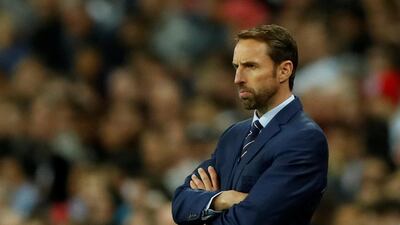The temptation was always to think of Gareth Southgate as the kind of eminently polite yes-man who could go far in corporate life, but the sort who are over-promoted as the supposed ‘safe pair of hands’.
There is a type: they say the right things in the right way but actually lack the gravitas and capacity for original thought to make them transformative leaders.
Yet Southgate is easily underestimated. A Football Association bureaucrat has actually been England’s courteous radical, a mild-mannered, middle-class meritocrat. He did something predecessors refused to and dropped Wayne Rooney.
His World Cup squad was notable for his refusal to duck a decision. Exit Joe Hart, whose descent from first-choice goalkeeper to outcast was swift but, based on his dismal performances, deserved.
___________
Read more:
Richard Jolly: David Moyes departs West Ham with reputation somewhat restored
Richard Jolly: Everton and Sam Allardyce a mismatch borne of desperation
WATCH: Liverpool legends Gerrard and McManaman dune bashing in Dubai
___________
So, too, was Nick Pope’s selection after a campaign when the Burnley revelation had the second-highest save percentage in the Premier League, and Hart the worst.
Southgate’s key words were: “Do I give the guys who have had a better season a chance?” His answer came in the affirmative; of those who missed out, only James Tarkowski, who has had an outstanding year at Burnley, can consider himself unfortunate on those grounds.
This World Cup squad, unlike some of their predecessors, was not picked on reputation, employment at a major club or history. As only Gary Cahill has won 40 caps and nine players have 10 or fewer, England are an inexperienced group.
Yet as their recent experience of major tournaments is largely negative, that should be no bad thing. Their squad has 449 caps, whereas Fabio Capello’s party in 2010 had 820; England were wretched then.
The notion of merit is reflected in the most and least experienced members of the 23-man party. Cahill had been dropped altogether: Southgate was open-minded enough to recall him after he returned to the Chelsea side.
The uncapped 19-year-old Trent Alexander-Arnold is the form horse, rewarded for a remarkable run that will culminate in a Uefa Champions League final appearance. His selection also signals that Kyle Walker will be used as a centre-back, not a wing-back.
The sense of fairness counted against Adam Lallana, a classy player Southgate would have liked but one whose injury problems have limited him to one league start this season. The Liverpool midfielder was widely expected to make the cut, but England have taken too many semi-fit players to previous competitions. Those risks have rarely been justified.
Yet a Lallana-less midfield may represent the main concern. Injury has stripped Southgate of Alex Oxlade-Chamberlain’s dynamism – and of another player who persuaded the manager to change his mind – but the instructive, if unsurprising, omissions were Jack Wilshere and Jonjo Shelvey.
The questions over the Arsenal man’s fitness and the Newcastle player’s temperament seemed to count against each. The problem is that it leaves England with a lack of creativity at the base of the midfield, something Southgate has tried to circumvent with a change of shape to 3-4-2-1 or 3-5-2. The gameplan will be to spring quick players forward.
Southgate may be a comparative rookie at international management, but he travelled to four tournaments as a player. He is aware of their complications. It is therefore significant that many of the more marginal selections, such as Ruben Loftus-Cheek, Danny Welbeck, Ashley Young and Fabian Delph, are versatile. They afford him more options.
Delph and Young also enabled Southgate to name a solitary specialist left wing-back: Danny Rose, one of the few who has had an undistinguished season, ahead of the unlucky Ryan Bertrand.
Yet Southgate has not merely been going through the motions on his scouting trips. Delph has not played for England since 2015. His choice suggested club performances may count for more than a consistent presence on the international stage: Jake Livermore, a faithful presence in Southgate’s earlier squads, is only on standby.
But selection should not be about loyalty to the long-serving, let alone predictable picks of the rich and famous, regardless of fitness or form. Southgate has turned his back on England’s past to produce a fresher, faster group.
The company man is in different company. They might not get the right results, but at least they are chosen on the right principles.


